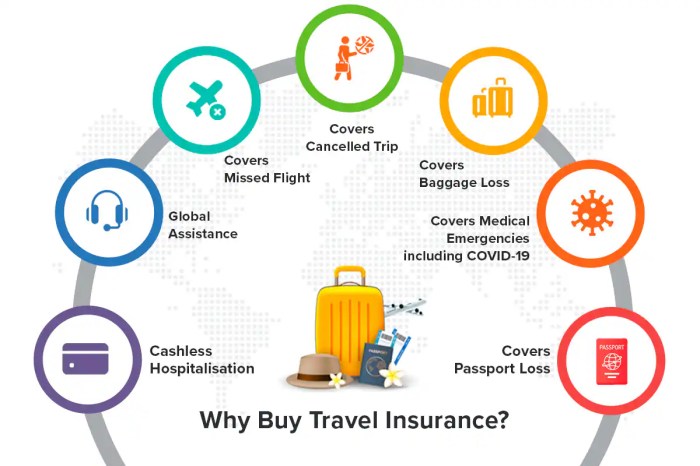Travel insurance benefits are like your ultimate safety net in the unpredictable world of travel. Imagine having peace of mind knowing you’re protected against unexpected mishaps and emergencies while exploring the world. Let’s dive into the realm of travel insurance benefits and uncover how they can enhance your travel experiences.
Overview of Travel Insurance Benefits
Travel insurance is a crucial aspect of trip planning, offering protection and peace of mind in case of unexpected events. Let’s explore the types of coverage typically offered and the benefits for different types of travelers.
Types of Coverage
- Medical Coverage: Covers medical expenses in case of illness or injury during travel.
- Trip Cancellation/Interruption: Provides reimbursement if you have to cancel or cut short your trip due to unforeseen circumstances.
- Baggage Loss/Theft: Offers compensation for lost, stolen, or damaged luggage.
- Emergency Evacuation: Covers costs for emergency medical evacuations to the nearest adequate medical facility.
Benefits for Different Travelers
- Family Travelers: Protects families from unexpected medical emergencies or trip cancellations.
- Solo Travelers: Provides peace of mind for those traveling alone, ensuring they have support in case of emergencies.
- Adventure Travelers: Offers coverage for high-risk activities and adventure sports.
Real-life Scenarios, Travel insurance benefits
Imagine your flight gets canceled due to bad weather, and you need to book a last-minute hotel stay. Travel insurance can reimburse you for these unexpected expenses.
Or, if you fall ill during your trip and require medical attention, travel insurance can cover the costs of hospitalization and treatment.
Medical Coverage

Travel insurance typically includes medical coverage, which helps travelers with unexpected medical expenses during their trip. This coverage can include doctor visits, hospital stays, emergency medical evacuation, and prescription medications.
How Medical Coverage Works in Different Countries
In some countries, travelers may need to pay for medical expenses upfront and then file a claim with their travel insurance provider for reimbursement. In other countries, the travel insurance company may work directly with medical facilities to cover costs. It’s important for travelers to understand how medical coverage works in the specific destinations they are visiting.
Comparing Different Travel Insurance Policies in Terms of Medical Benefits
When comparing travel insurance policies, it’s crucial to look at the medical benefits offered. Some policies may have higher coverage limits, while others may have more comprehensive coverage for pre-existing conditions. It’s essential to choose a policy that aligns with your specific medical needs and travel plans.
Tips for Travelers on Maximizing Medical Coverage Benefits
– Always carry your travel insurance policy details and contact information with you while traveling.
– Be aware of any exclusions or limitations in your medical coverage, especially related to pre-existing conditions.
– Seek medical attention promptly if needed and keep all receipts and documentation for insurance claims.
– Inform your travel insurance provider as soon as possible in case of a medical emergency.
Trip Cancellation and Interruption: Travel Insurance Benefits

Travel insurance often includes coverage for trip cancellation and interruption, providing financial protection in case unforeseen circumstances force you to cancel or cut short your trip.
Coverage Details
- Reimbursement for non-refundable trip costs if you have to cancel your trip before departure.
- Compensation for additional expenses incurred due to trip interruption, such as rebooking fees or accommodation costs.
- Coverage for missed connections or delays that result in additional expenses.
Examples of Coverage Application
- If you have to cancel your trip due to a sudden illness or injury.
- If a family member falls seriously ill and you need to return home before your trip ends.
- If your flight is delayed and you miss a connecting flight, resulting in additional costs for accommodation and rebooking.
Common Exclusions
- Canceling due to pre-existing medical conditions not covered by the policy.
- Interruption caused by participating in high-risk activities not covered by the policy.
- Canceling due to changes in personal plans or preferences.
Tips for Travelers
- Read the policy details carefully to understand what is covered and any exclusions that may apply.
- Keep documentation of the reason for cancellation or interruption, as this will be required when filing a claim.
- Contact your insurance provider as soon as possible in case of cancellation or interruption to start the claims process promptly.
Baggage Loss and Delay
When it comes to travel insurance, one important aspect to consider is the coverage for baggage loss and delay. This can save you from a lot of stress and financial burden during your trip.
Coverage for Baggage Loss and Delay
Most travel insurance policies provide coverage for baggage loss and delay. In case your baggage is lost during transit, the insurance will reimburse you for the value of your belongings. Similarly, if your baggage is delayed for an extended period, you may be eligible for reimbursement for essential items you need to purchase during the delay.
Making a Claim for Lost or Delayed Baggage
When your baggage is lost or delayed, you should immediately inform the airline or transportation provider and file a report. Make sure to keep all receipts for any essential items you purchase during the delay. You will need these documents to make a claim with your travel insurance provider.
Comparison of Baggage-Related Benefits in Different Policies
- Some travel insurance policies have higher limits for baggage coverage than others, so it’s important to compare the benefits offered by different providers.
- Certain policies may also have specific exclusions or limitations when it comes to valuable items such as electronics or jewelry, so be sure to read the fine print.
- Premium policies may offer additional benefits like coverage for baggage delay due to a missed connection or coverage for high-value items.
Advice on Preventing Baggage Loss and Dealing with Delays
- Always label your baggage with your contact information to increase the chances of it being returned to you if lost.
- Consider using luggage tags with tracking technology to easily locate your bags in case of delay.
- Carry essential items like medications, valuables, and important documents in your carry-on luggage to avoid any inconvenience in case of baggage loss or delay.